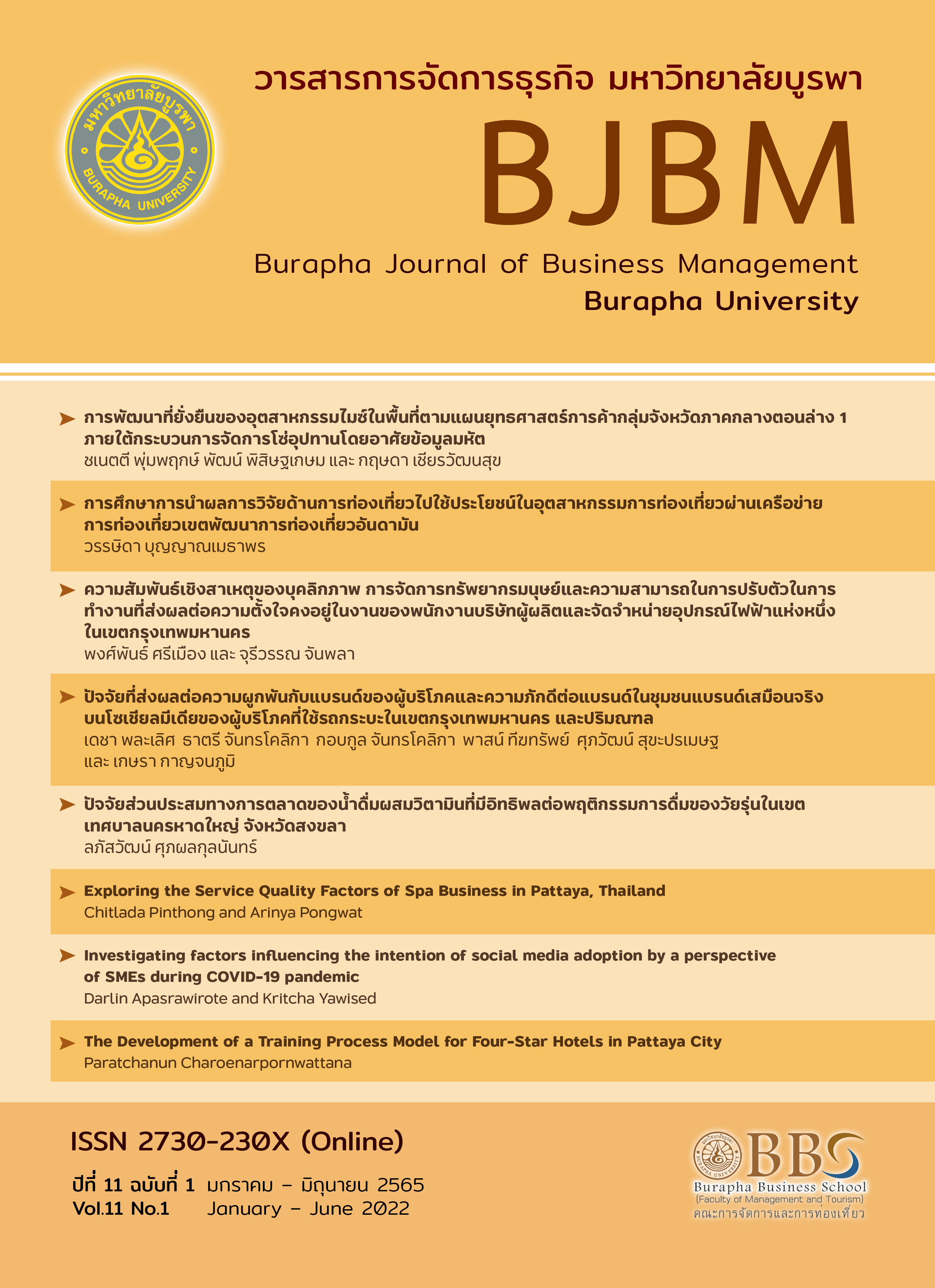การศึกษาการนำผลการวิจัยด้านการท่องเที่ยวไปใช้ประโยชน์ ในอุตสาหกรรมการท่องเที่ยวผ่านเครือข่ายการท่องเที่ยว เขตพัฒนาการท่องเที่ยวอันดามัน
Main Article Content
บทคัดย่อ
งานวิจัยนี้มีวัตถุประสงค์เพื่อศึกษาการนำผลการวิจัยด้านการท่องเที่ยวไปใช้ประโยชน์ในอุตสาหกรรมการท่องเที่ยวผ่านเครือข่ายการท่องเที่ยว โดยใช้ระเบียบวิธีวิจัยเชิงคุณภาพและเก็บข้อมูลด้วยการสนทนากลุ่มกับภาคีการท่องเที่ยวในเขตพัฒนาการท่องเที่ยวฝั่งอันดามัน โดยกลุ่มตัวอย่างประชากรคัดเลือกจากหน่วยงานในพื้นที่ จำนวน 88 หน่วยงาน จากนั้นนำข้อมูลมาวิเคราะห์แบบแก่นสาระ ผลการวิจัยพบว่า การนำผลการวิจัยไปใช้ประโยชน์ในอุตสาหกรรมการท่องเที่ยวของภาคีท่องเที่ยวมีปัญหาและอุปสรรค 6 ด้าน ได้แก่ ความรู้ในการเข้าถึงแหล่งข้อมูลงานวิจัย ความเข้าใจงานวิจัย ความน่าเชื่อถือของข้อมูล คุณลักษณะงานวิจัย ความทันสมัยของงานวิจัย และการเผยแพร่ผลงานวิจัย นอกจากนี้ พบว่าภาคีเครือข่ายการท่องเที่ยวต้องการประเด็นวิจัยเพื่อนำไปใช้ประโยชน์ 12 ประเด็น โดยจำแนกตามกลุ่มผู้ใช้ประโยชน์จากงานวิจัยดังนี้ กลุ่มภาคเอกชนหรือผู้ประกอบการธุรกิจท่องเที่ยวใช้ประโยชน์ 5 ด้าน คือ 1) บุคลากรทางการท่องเที่ยว 2) สินค้าและบริการทางการท่องเที่ยว 3) การตลาดการท่องเที่ยว 4) ธุรกิจท่องเที่ยว 5) กฏหมายการท่องเที่ยว กลุ่มภาครัฐและรัฐวิสาหกิจใช้ประโยชน์ 4 ด้าน คือ 1) งานวิชาการและการวิจัย 2) นโยบายและยุทธศาสตร์การท่องเที่ยว 3) การคมนาคมขนส่ง 4) การพัฒนาศักยภาพการท่องเที่ยวในด้านต่าง ๆ และกลุ่มชุมชนใช้ประโยชน์ 5 ด้าน คือ 1) แหล่งท่องเที่ยว 2) สินค้าและบริการทางการท่องเที่ยว 3) บุคลากรทางการท่องเที่ยว 4) การตลาดการท่องเที่ยว 5) อื่น ๆ เช่น การเขียนข้อเสนอเพื่อของบประมาณพัฒนาการท่องเที่ยว โดยกลุ่มเป้าหมายผู้ใช้ประโยชน์จากงานวิจัยจำแนกได้ 4 กลุ่มเป้าหมาย คือ ภาคเอกชน ภาครัฐและรัฐวิสาหกิจ ภาคชุมชน และภาควิชาการ
Article Details

อนุญาตภายใต้เงื่อนไข Creative Commons Attribution-NonCommercial-NoDerivatives 4.0 International License.
บทความที่จะตีพิมพ์เพื่อเผยแพร่ในวารสารการจัดการธุรกิจ มหาวิทยาลัยบูรพา จะต้องเป็นบทความที่ไม่เคยได้รับการตีพิมพ์เผยแพร่หรืออยู่ระหว่างการพิจารณาเพื่อตีพิมพ์เผยแพร่ในวารสารอื่น ๆ ทั้งนี้ หากพบว่ามีการละเมิดลิขสิทธิ์ ด้วยข้อคิดเห็นที่ปรากฏและแสดงในเนื้อหาบทความต่าง ๆ ให้ถือว่าเป็นความเห็นและความรับผิดชอบโดยตรงของผู้เขียนบทความนั้น ๆ มิใช่ความเห็นและความรับผิดชอบใด ๆ ของคณะบริหารธุรกิจ มหาวิทยาลัยบูรพา สำหรับในกรณีผู้ประสงค์จะนำข้อความในวารสารการจัดการธุรกิจ มหาวิทยาลัยบูรพา ไปเผยแพร่ต้องได้รับอนุญาตจากกองบรรณาธิการวารสารการจัดการธุรกิจ มหาวิทยาลัยบูรพา ตามกฎหมายว่าด้วยลิขสิทธิ์
เอกสารอ้างอิง
กาญจนา แก้วแทพ. (2538). เครื่องมือทำงานแนววัฒนธรรมชุมชน. กรุงเทพฯ: สภาคาทอลิกแห่งประเทศไทยเพื่อการพัฒนา.
เกรียงศักดิ์ เจริญวงศ์ศักดิ์. (2543). การจัดการเครือข่าย: กลยุทธ์สู่ความสำเร็จของการปฏิรูปการศึกษา. กรุงเทพฯ: สถาบันอนาคตศึกษาเพื่อการพัฒนา.
ดนุวัส สุวรรณวงศ์ และ ภัทรพงษ์ เกริกสกุล. (2559). การพัฒนาเครือข่ายการท่องเที่ยวโดยชุมชนในเขตพื้นที่ 5 จังหวัดชายแดนภาคใต้ (สตูล สงขลา ปัตตานี ยะลา และนราธิวาส) กับการเชื่อมต่อพื้นที่การท่องเที่ยวใน 4 รัฐ (กลันตัน เปรัค เคดาห์ และเปอร์ลิส) ประเทศมาเลเซีย. (รายงานการวิจัย). สำนักงานคณะกรรมการวิจัยแห่งชาติ และสำนักงานกองทุนสนับสนุนการวิจัย.
ธนวิทย์ บุตรอุดม, วิศท์ เศรษฐกร, และ วยิดา เหล่มตระกูล. (2564). การพัฒนาระบบการจัดการเพื่อการขับเคลื่อนผลงานวิจัยไปสู่การพัฒนาจังหวัดลำปาง. วารสารด้านการบริหารรัฐกิจและการเมือง, 10(2), 185-204.
นรินทร์ พุดลา. (2556). การนำผลการวิจัยไปใช้ในทางการบริหารการศึกษา. สืบค้นเมื่อ 17 มีนาคม 2565. สืบค้นจาก http://www.slideshare.net/rooganawut/ss-4582098
นฤมล นิราทร. (2543). การสร้างเครือข่ายการทำงาน: ข้อควรพิจารณาบางประการ. กรุงเทพฯ: สำนักพิมพ์มหาวิทยาลัยธรรมศาสตร์.
เบญจวรรณ สุจริต และ ชัชชัย สุจริต. (2560). รูปแบบการจัดการท่องเที่ยวโดยชุมชนของตำบลนางพญา อำเภอท่าปลา จังหวัดอุตรดิตถ์. วารสารวิชาการมหาวิทยาลัยราชภัฏอุตรดิตถ์. 12(2), 53-65.
ประเวศ วะสี. (2542). เศรฐกิจพอเพียงและประชาสังคม. กรุงเทพฯ: ไทยวัฒนาพานิช.
ภคิน ไชยช่วย. (2015). ปัจจัยที่มีอิทธิพลต่อการนำผลการวิจัยไปใช้ประโยชน์ของบุคลากรและนักศึกษาเครือข่ายสถาบัน วิชาการสาธารณสุขและเทคโนโลยีทางการแพทย์สถาบันพระบรมราชชนกกระทรวงสาธารณสุข. วารสารวิชาการศึกษาศาสตร์ ศรีนครินทรวิโรฒ, 16(1), 136-146.
ภีราวิชญ์ ชัยมา และ สิริสาสน์ พันธ์มณี. (2563). การสร้างเครือข่ายและศูนย์กลางบริการข้อมูลธุรกิจท่องเที่ยวจังหวัดเชียงราย. วารสารสังคมศาสตร์และมานุษยวิทยาเชิงพุทธ. 5(7), 169-182.
รัจน์ชีวาต์ ตั๋นติกุลวรา และ สุทธินันท์ โสตวิถี. (2562). การเสริมสร้างศักยภาพโดยการมีสวนร่วมของชุมชนเพื่อการพัฒนาการท่องเที่ยวอย่างยั่งยืนในจังหวัดจันทบุรี. วารสารมหาวิทยาลัยนราธิวาสราชนครินทร์ สาขามนุษยศาสตร์และสังคมศาสตร์. 6(1), 92-105.
สนธยา พลศรี. (2550). เครือข่ายการเรียนรู้ในงานพัฒนาชุมชน. กรุงเทพฯ: สำนักพิมพ์โอเอส พริ้นติ้งเฮ้าส์.
สำนักงานการวิจัยแห่งชาติ, (2559). ยุทธศาสตร์การวิจัยรายประเด็นด้านการท่องเที่ยว (พ.ศ. 2555-2559). สืบค้นเมื่อ 20 สิงหาคม 2564, สืบค้นจาก https://www.kmutt.ac.th/rippc/nrct59/33s9.pdf
สำนักงานสภาพัฒนาการเศรษฐกิจและสังคมแห่งชาติ, (2562). แผนพัฒนาภาคใต้ พ.ศ. 2560 – 2565 ฉบับทบทวน. สืบค้นเมื่อ 20 สิงหาคม 2564, สืบค้นจาก https://www.nesdc.go.th/ ewt_dl_link.php?nid=8537
เสรี พงศ์พิศ. (2548). เครือข่าย: ยุทธวิธีเพื่อประชาคมเข้มข้น ชุมชนเข้มแข็ง. กรุงเทพฯ: เจริญวิทย์การพิมพ์.
Alexander, M., & Orton, H. (1988). Research in action. Nursing Times, 84(8), 38-41.
Anderson, W. & Sanga, J. (2019). Academia–industry partnerships for hospitality and tourism education in Tanzania. Journal of Hospitality & Tourism Education, 31(1), 34-48.
Braun, V. & Clarke, V. (2006). Using thematic Research in Psychology. Qualitative Research in psychology, 3(2), 77-101.
Estrin, S., Gozman, D., & Khavul, S. (2018). The evolution and adoption of equity crowdfunding: entrepreneur and investor entry into a new market. Small Business Economics, 51(2), 425-439.
Graci, S. (2013). Collaboration and Partnership Development for Sustainable Tourism. Tourism Geographies, 15(1), 25-42.
Gutierrez, E. L. M. (2019). Participation in tourism: Cases on community-based tourism (CBT) in the Philippines. Ritsumeikan Journal of Asia Pacific Studies, 37, 23-36.
Jamal, T., & Stronza, A. (2009). Collaboration Theory and Tourism practice in protected areas: stakeholders, structuring and sustainability. Journal of Sustainable Tourism, 17(2), 169-189.
Kapera, I. (2018). Sustainable tourism development efforts by local governments in Polnd. Sustainable Cities and Society, 40, 581-588.
Kaur, H., & Bains, A. (2013). Understanding the concept of entrepreneur competency. Journal of Business Management & Social Sciences Research, 2(11), 31-33.
Mitchell, J.C.S. (1968). Networks in Urban Situation. Manchester: Manchester University Press.
Ngo, T., Hales, R., & Lohmann, G. (2019). Collaborative marketing for the sustainable development of community-based tourism enterprises: a reconciliation of diverse perspectives. Current Issues in Tourism, 22(18), 2266-2238.
Sharma, Y. (2013). Women Enterpreneur In India. Journal of Business and Management (IOSR-JBM), 15(3), 09-14.
Starkey, Payl. (1997). Networking for Development. London: IFRTD
Wong, E. P., Mistilis, N., & Dwyer, L. (2011). A model of Asean collaboration in tourism. Annals of Tourism Research, 38(3), 882-899.


